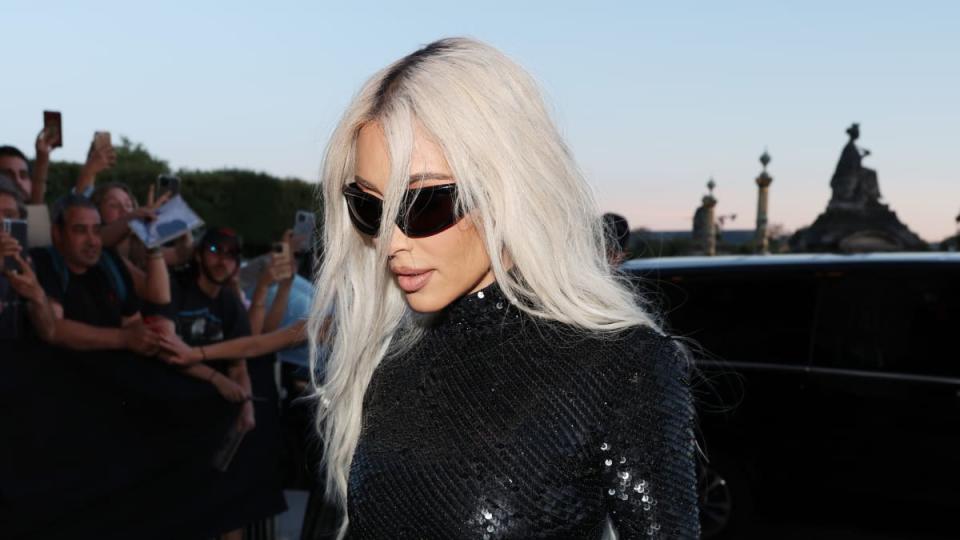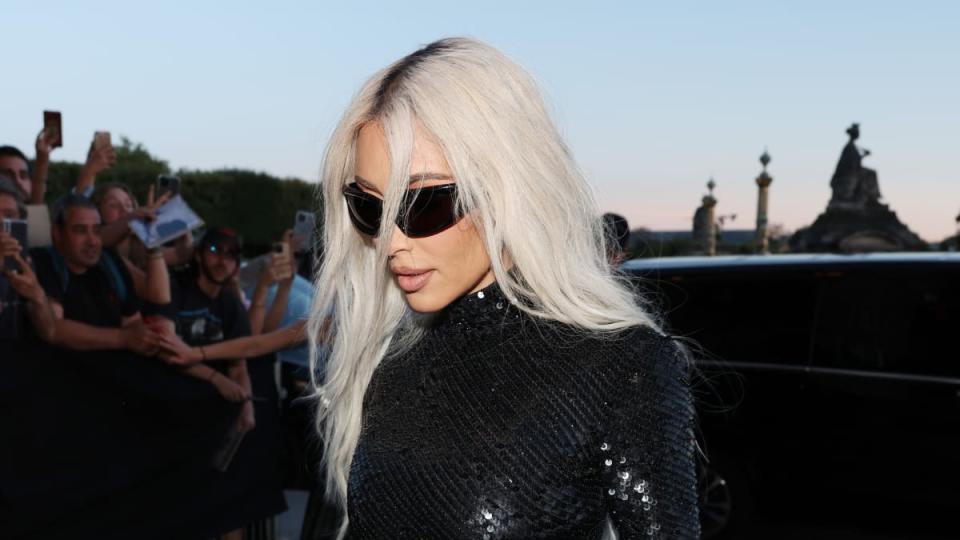What to Expect From Kim Kardashian's New Private Equity Firm
- Oops!Something went wrong.Please try again later.
With help from an industry veteran, the Skims founder is setting her sights on other consumer-goods and media companies.
Despite being "a girl with no talent," Kim Kardashian is quite good at making money. Her net worth, as it stands right now, according to Forbes, comes in at $1.8 billion — roughly the GDP of Belize. And it's steadily rising: It was $1 billion last year, and $900 million the year before.
Not only does she know how to make money, but she also knows how to have her money work for her. Only now, she's set to do this professionally.
In September, Kardashian announced the launch of Skky Partners, a private equity firm she's co-founded with Jay Sammons, a former executive at global investment firm Carlyle Group. With plans to primarily invest in "high-growth, market-leading consumer and media companies," per a tweet, Skky Partners (which did not respond to Fashionista's request for comment) will also target the hospitality, luxury and digital and e-commerce sectors. Kris Jenner, Kardashian's mother and the family's long-time manager, will also serve as a partner.
It's big news, as evidenced by the company she keeps: Sammons, Kardashian's co-managing partner, previously ran Carlyle's multinational consumer, media and retail division, having worked with global brands like Supreme, Beats by Dre and Moncler. And with more and more celebrities journeying into the investment space, Kardashian is in good company. Take Serena Williams's venture capital firm Serena Ventures, for example, which raised an inaugural fund of $111 million just this past March.
Still, celebrities need not operate a full-scale financial institution to play the game. Today, more and more are moving away from turnkey spokesperson opportunities in the interest of more involved investments in companies that are in alignment with their brands. With Skky Partners, Kardashian is wading even deeper into the money pool, but it's not the easy cash grab one may suspect. What is she putting on the line — and better yet, what does she stand to gain?
To participate in private equity, as in any financial sector, is to be engaging in a certain amount of calculated risk. Now, when compared to something like venture capital, private equity is considered to be a somewhat safer operation, with fewer opportunities for loss, at least on paper. But that doesn't mean it's not without its liabilities.
"Venture capital requires a lot of skill,” says Thomaï Serdari, adjunct professor of marketing and director of the Fashion & Luxury MBA at New York University's Stern School of Business. "You find startups you believe have good potential and you invest in them, but there's no guarantee you're going to make your money back. You need to have expertise in whatever you're investing, and offer mentorship to be on the board to actually manage these companies and help them grow."
Private equity, she explains, is run very differently. Private equity funds tend to be much larger in scope, investing in an intimate portfolio over an extended duration of time, with the goal of turning around and ultimately exiting their respective companies when profitable via a trade sale, IPO or secondary buyout. Traditionally, this is done by bringing in their own leadership teams to rebuild the business from the C-suite down. In that sense, then, private equity is really only as secure as your management, no matter how deep your pockets.
"Between [Jenner and Kardashian], mother and daughter, the fund is quite substantial, and they can go after companies that already have a lot of brand equity with the public," Serdari says. "And because these companies are already known entities, they have better prospects of being profitable, if the management you bring in is capable of turning around the company."
In Serdari's eyes, Sammons, a 16-year Carlyle veteran, has what it takes to not simply legitimize, but quickly scale this new firm in the competitive consumer-goods space. He knows the space inside out, to be sure, but what's more valuable is that he presumably joins Skky Partners with a rolodex packed with talent, be they partners focused on company representation and client relationships or directors tasked with fundraising and facilitating deals.
"The important point here is to think of each one of these private equity professionals as a hub of relationships," says Serdari. "If you bring that with you, you have really great prospects of creating an equally powerful brand that can compete with a Carlyle brand, for example."
Which is where Kardashian herself comes in. Brand-building is squarely her region of expertise, the most relevant case study of which is Skims. This January, her underwear, loungewear and shapewear company announced it had doubled its valuation to $3.2 billion after raising $240 million in fresh funds from a collection of "A" list investors. While it's not uncommon for venture-backed darlings to overpromise and underdeliver, Skims is vying to do the opposite: Sales are predicted to hit $400 million this year, demonstrating a growth rate that's as compelling as it is increasingly rare. KKW Beauty, meanwhile, is a viable testament in its own right, selling to global beauty conglomerate Coty in a monster $200-million deal in 2020.
"She has a good eye; she knows what’s popular," says Serdari. "She can spot a company that has maybe declined a little bit, but has potential in that the brand equity is there. She could both revitalize the brand and make a big impact on consumers' lives with a new, redesigned product, turning the company around, making the profit and exiting eventually."
Skky Partners is keeping mum on any fund specifics, but Serdari predicts one arena Kardashian herself may hone in is women-led brands. Private equity is dismally inequitable for all those who don't identify as the industry standard, i.e., white, straight, cisgender males. Women, for instance, made up about 12.7% of senior employees at North American private equity funds in 2021 — less than half the finance industry average, according to research by Preqin and McKinsey & Co. The study found that while junior positions are indeed closer to gender parity, the number of women dwindles as you move up the ranks.
The opportunity isn't only for Kardashian herself to give a new face to private equity, but to include more women in leadership internally, as well as throughout the firm's portfolio of brands. Tapping Sammons reflects that commitment, too: Carlyle, his alma mater, has "long touted its diversity and emphasizes that nearly half of its employees are women," writes Fortune. And when CEO Kewsong Lee abruptly resigned in August, it was widely speculated that his replacement would and should be a woman, which, again according to Fortune, would "set Carlyle apart from its rivals, which are all led by men."
The only question left is that of timing. Why now? Despite an impending recession threatening to upend businesses of all makes and models, investors are holding steady on solid ground. The best returns come after periods of economic downturn, after all: According to Bain Consulting's latest midyear private equity report, investors can often earn superior internal rates of return in years following recessions.
"You go after companies that are suffering because of the economy, and you take over management when things are bad," says Serdari. "When the economy's good in the next three years, let's say, you've turned around the business and have an amazing brand you can sell to consumers."
Something that may not have been such great timing was Kardashian's recent $1.26-million Securities and Exchange Commission fine, which she received for failing to disclose a $250,000 payment by a crypto brand she plugged on social media. Though Kardashian herself wasn't convicted of a violation, MarketWatch has reported that the financial penalty could discourage institutional investors from backing her new firm.
But is all press in fact good press? We'll know more on the other side of Kardashian and Sammons' inaugural fundraising cycle, which is reportedly eyeing a $1-billion target.
"[Launching Skky Partners] is a move that creates buzz. It's not only taking care of her finances with profits to look forward to, but it also creates a lot of buzz around her name," says Serdari. "And why not have women visible in private equity? I think that's a very positive thing."
Never miss the latest fashion industry news. Sign up for the Fashionista daily newsletter.


